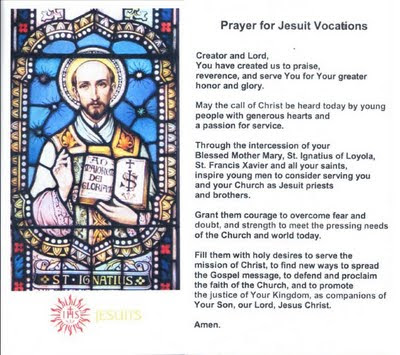
"Ye shall know the truth, and the truth shall make you free.”--John viii. 32.
How can I make myself available to the mission of the Lord? Often I have asked myself: is my apostolic availability genuine? If not, then in what way can I be genuine? How can I be true to myself and to God? How can I discern the will of God? How will I know the ultimate truth? Can this ultimate truth-principle make me free and detach myself so as to obey the will of God?
Jesus is our ultimate model in and through Him we learn how to discern and obey the Fathers’ will. He deserves all praise, service and glory. He is the goal of our lives. Considering the work of the Holy Spirit in our daily activities, GC 35 has brought out a wonderful document regarding the goal and purpose of life in the Society. It has rejuvenated the spirit within me and to look up to our model-Jesus. Fr. John English, S.J. of the Canadian Province in his article on ‘goal and purpose of life’ invites the Society to uphold the spirit of discernment and thus make oneself available totally to apostolic work. We need to discern our vocation all time by recalling the various life-experiences and learn to appreciate the constant presence of God in our lives. St. Ignatius of Loyola expresses our purpose and goal in this way: God's purpose in creating us is to draw forth from us a response of praise, reverence, and service to God (like that of Christ) and in this way to experience the fullness of being. (Spiritual Exercises: Principle and Foundation).
1. Discerning Interior Movements:
As I begin to discern genuinely, many different interior experiences take place with in me. Some I have never had before. Some are very strange indeed. Yet, it is good to know that other people before me have had similar experiences when trying to discover their vocation. By paying attention to the spirit which is active within, and I try to concentrate on my willingness to listen to the divine. Stubborn heart will not experience the love of God.
2. Overall Goal and Purpose of my Life:
It is important to reflect deeply on the goal and purpose of all human and Christian life. It gives me a vision to my life. This gives me a perspective on life that helps me to find the freedom necessary to make myself available to vocation I am blessed with. ‘Love one another as I have loved you’ should become the motto of my life always.
3. Sense of Identity as the Beloved of God:
It is in the context of the love of God for each one of us that we set out to discover our vocation. For, it is in response to God's love for me that I will discover God's desire for me. This love of God floods my heart and draws me to him as I serve other men and women in whatever state of their life. It is helpful to reflect prayerfully on the various experiences of my life that indicate God's unique love for me. This knowledge will give me the freedom to be open to whatever vocation I sense God is calling me to be. God cannot fail me. Yet he is beyond my comprehension. So I make an effort to find him in the people I meet every day.
4. I Pray for Light and Strength:
I ask the Lord to move my mind and heart that I may better serve him and his people. Once again I realize that this process is carrying me to seek help from God. The help that I need is both in my mind and in my heart. I need both clarity and strength. I need to recognize the ways in which I can best serve the Lord. But I also need the strength to overcome the many fears and obstacles that I and others will put in my path.
5. Diverse cultural impact:
We indeed come in touch with people who are intelligent and multifaceted. Ignatius was such a man. In spite of having a lot of relationship problems he had genuinely accepted all people. Like St.Ignatius, we too today live in a multi cultural world which can shape our lives, mould hearts and overcome obstacles and fears. Awareness and adaptability to different cultures truly broaden the horizon of relationships.
6. Accept others:
Accepting others as they are is primary to all relationships. Availability is for the service. I will not be able to serve unless I accept others as they are. All my philosophy training will not make any sense unless I grow in openness which would enable me to know others in truth and justice. If I am open, then I will value others’ presence in my life..
I remind myself often that Jesuit is a person whose mission is to dedicate himself entirely to the service of faith and the promotion of justice, in a communion of life, work and sacrifice with the companions. Life, work and service in the community can give me happiness only when I am open to God’s grace. This life in the community ought to manifest in my apostolic availability. The work I do for the growth and happiness of the community is the key to success in the vineyard of the Lord. The more genuine and serviceable I am to the community, the stronger the power of happiness that I will experience. The spirit of the Society enables me to be available to the needs of the deprived people and of the depleted earth which sustains life at various levels. Availability opens many doors and all doors lead to God who is the ultimate meaning of life.
How would Ignatius respond to today’s challenges is a big question. He surely would have given a depth dimension to the Ignatian spirituality and to the Christian faith. It would not be ‘a bed of roses’ for him either. The world today presents new challenges and we need persons of Ignatius’ caliber to face them squarely. There is a lot of scope for better work in the contemporary world. It is only through the Lord’s help that we can make this world a better place to live. Could we make ourselves available to the Lord’s noble calling today? What is your response? Wish you all a very Happy Advent.




